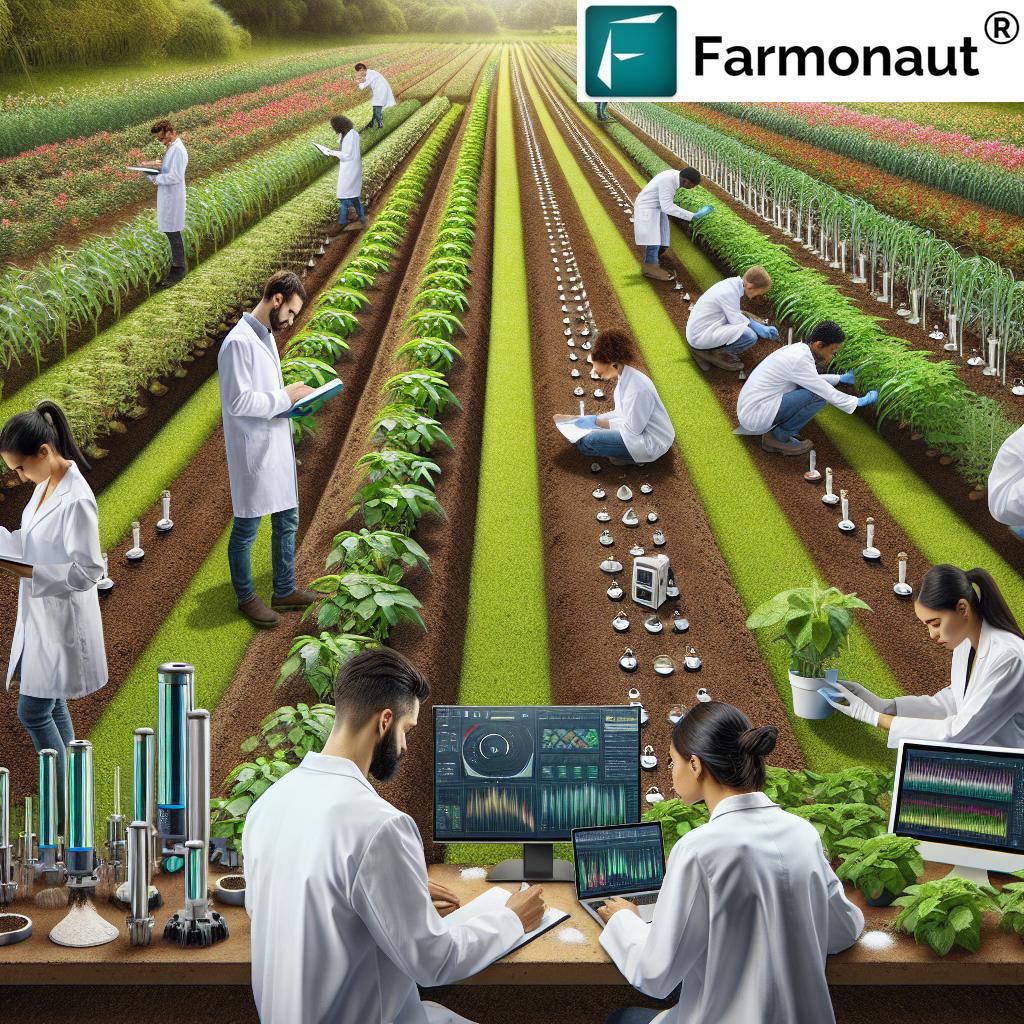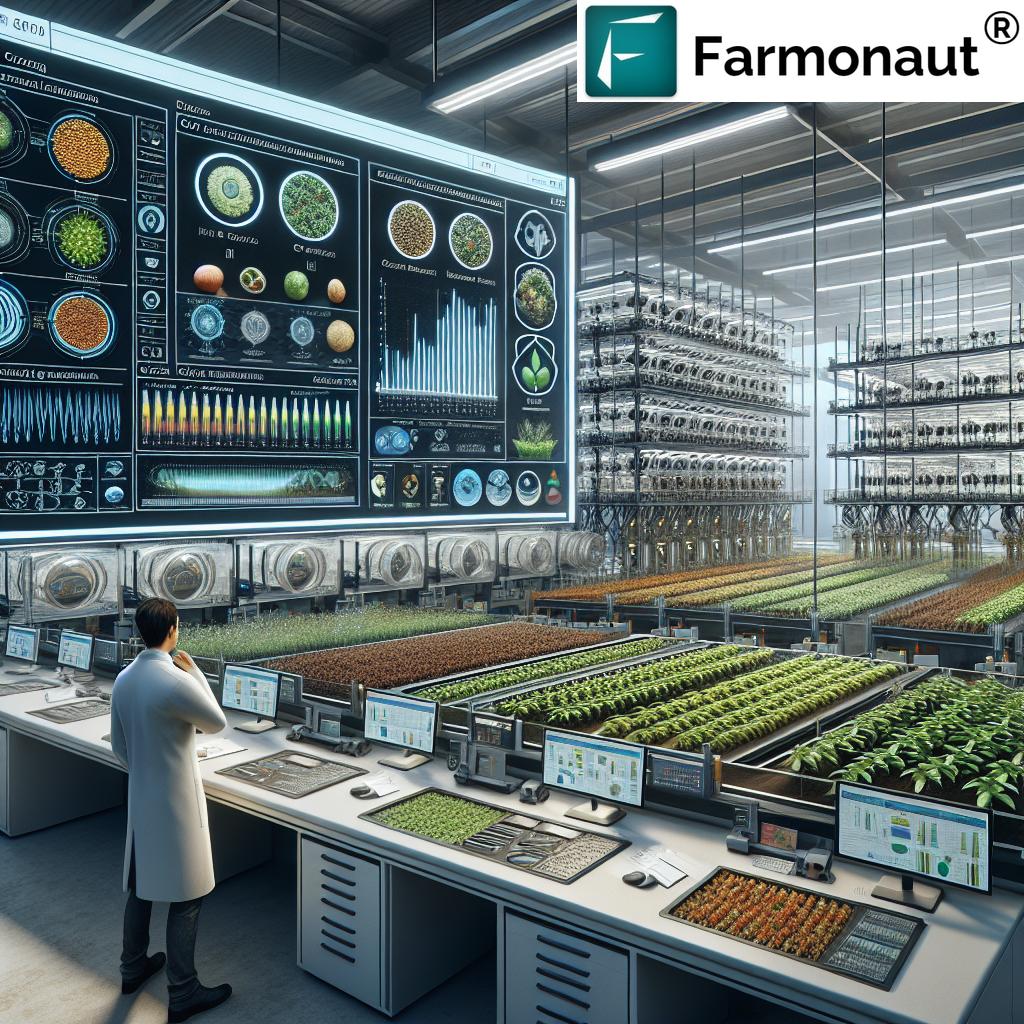Empowering Florida’s Future: Innovative Soil Science Research and Precision Nitrogen Management in Graduate Agronomy
“Graduate agronomy research has led to a 15% increase in crop resilience through advanced soil-nutrient interaction studies.”
Welcome to the cutting-edge world of soil science research and graduate student opportunities in agronomy! As we delve into the fascinating realm of innovative agricultural practices and precision nitrogen management, we’ll explore how these advancements are shaping the future of agriculture, particularly in the vibrant state of Florida. Our journey will take us through the latest technologies, groundbreaking studies, and the critical role of agricultural sustainability practices in environmental conservation.
The Evolution of Soil Science Research in Florida
Florida, with its unique climate and diverse agricultural landscape, has long been at the forefront of soil science research. As graduate students and researchers, we are privileged to be part of this exciting field that is constantly evolving to meet the challenges of modern agriculture.
- Soil health optimization techniques
- Crop resilience genetics
- Precision nitrogen management
- Innovative agricultural practices
These areas of study are not just academic pursuits; they have real-world implications for farmers, environmentalists, and consumers alike. By focusing on these key aspects, we’re working towards a more sustainable and productive agricultural future.
Precision Nitrogen Management: A Game-Changer in Agriculture
One of the most exciting developments in our field is precision nitrogen management. This innovative approach allows us to optimize nitrogen application, reducing waste and environmental impact while maintaining or even improving crop yields.
“Precision nitrogen management techniques developed by soil scientists have reduced fertilizer use by 20% while maintaining yields.”
At Farmonaut, we’re proud to be at the forefront of this revolution. Our satellite-based farm management solutions provide real-time data on crop health, allowing farmers to make informed decisions about nitrogen application. This technology is not just theoretical; it’s being implemented in fields across Florida and beyond, demonstrating real results.

Graduate students in agronomy are playing a crucial role in advancing this technology. Through rigorous research and field trials, we’re constantly refining our understanding of nitrogen dynamics in various soil types and crop systems.
Innovative Agricultural Practices: Drones and Beyond
The integration of drone technology in agriculture has opened up new avenues for research and practical applications. Nutrient management using drone technology is one of the most promising areas of study for graduate students in agronomy.
- High-resolution imaging for crop health assessment
- Precise application of fertilizers and pesticides
- Rapid data collection for large-scale field studies
These tools allow us to gather data at unprecedented scales and resolutions, enabling more accurate and timely decision-making in farm management. At Farmonaut, we’re excited to see how our satellite-based solutions can complement and enhance these drone-based technologies.
As graduate students, we’re not just learning about these technologies; we’re actively contributing to their development and implementation. This hands-on experience is invaluable as we prepare for careers in agricultural science and technology.
Soil-Nutrient Interaction Dynamics: Unraveling the Complexities
Understanding the intricate relationships between soil properties and nutrient availability is crucial for optimizing crop production. Our research in soil-nutrient interaction dynamics is shedding new light on these complex processes.
- Micronutrient availability in different soil types
- Impact of soil pH on nutrient uptake
- Role of organic matter in nutrient retention
By delving deep into these interactions, we’re developing more effective strategies for soil management and fertilization. This knowledge is crucial for sustainable agriculture, especially in Florida’s diverse soil landscapes.
Crop Resilience Genetics: Breeding for the Future
Climate change and environmental stresses pose significant challenges to agriculture. Our work in crop resilience genetics aims to develop varieties that can thrive in challenging conditions while maintaining high yields.
- Drought-resistant crop varieties
- Salt-tolerant plants for coastal regions
- Heat-resistant cultivars for a warming climate
This research is not just about creating hardier plants; it’s about ensuring food security for future generations. By combining traditional breeding techniques with cutting-edge genetic technologies, we’re pushing the boundaries of what’s possible in crop development.

Environmental Impact of PFAS in Agriculture: A Growing Concern
Per- and polyfluoroalkyl substances (PFAS) have emerged as a significant environmental concern, including in agricultural settings. As graduate students, we’re at the forefront of research into the impacts of these persistent chemicals on soil and crop health.
- Assessing PFAS levels in agricultural soils
- Studying uptake and accumulation in crops
- Developing remediation strategies for contaminated soils
This research is crucial for ensuring the safety of our food supply and protecting environmental health. It’s an area where soil science intersects with public health, highlighting the broad impact of our work.
Agricultural Sustainability Practices: Balancing Production and Conservation
Sustainability is at the heart of modern agricultural research. As graduate students in agronomy, we’re constantly exploring ways to increase productivity while minimizing environmental impact.
- Cover cropping for soil health improvement
- Reduced tillage practices
- Integrated pest management strategies
These practices not only benefit the environment but also contribute to long-term farm profitability. At Farmonaut, we’re proud to support these efforts through our advanced monitoring and management tools.
Our satellite-based crop monitoring system allows farmers to track the effectiveness of their sustainability practices in real-time, making it easier to adopt and refine these approaches.
Advanced Soil Analysis Methods: Unlocking the Secrets of Soil Health
The field of soil analysis is experiencing a revolution, thanks to new technologies and methodologies. As graduate students, we’re learning and contributing to these advancements, which are crucial for precision agriculture.
- Spectroscopic techniques for rapid soil analysis
- Machine learning algorithms for soil property prediction
- High-throughput phenotyping for soil microbial communities
These advanced methods allow us to gain deeper insights into soil health and fertility, informing more precise management decisions. Farmonaut’s integration of these data sources into our platform helps bridge the gap between research and practical application.
Climate Change and Agricultural Innovations
Climate change poses significant challenges to agriculture, but it also drives innovation. Our research is focused on developing strategies to mitigate and adapt to these changes.
- Carbon sequestration in agricultural soils
- Water-efficient irrigation systems
- Climate-smart crop rotations
By addressing these challenges head-on, we’re not just preparing for the future; we’re actively shaping it. Farmonaut’s carbon footprinting feature is just one example of how technology can support these efforts, helping farmers track and reduce their environmental impact.
Professional Societies: Fostering Collaboration and Knowledge Sharing
As graduate students in agronomy, we benefit greatly from involvement in professional societies. These organizations play a crucial role in our development as scientists and practitioners.
- Networking opportunities with industry leaders
- Access to cutting-edge research through conferences and journals
- Professional development workshops and webinars
Societies like the Soil Science Society of America and the American Society of Agronomy provide platforms for us to share our research, learn from others, and stay connected with the broader agricultural community.
The Role of Technology in Modern Agronomy
Technology is transforming every aspect of agriculture, and as graduate students, we’re at the forefront of this digital revolution. From satellite imagery to AI-powered analytics, we’re learning to harness these tools for better agricultural outcomes.
Farmonaut’s platform is an excellent example of how technology can empower farmers and researchers alike. Our API allows for seamless integration of satellite and weather data into various agricultural applications, while our mobile apps bring precision agriculture to the fingertips of farmers worldwide.
For those interested in developing their own applications using our data, we encourage you to check out our API Developer Docs.
Graduate Research Areas and Their Impact
To better understand the scope and impact of graduate research in soil science and agronomy, let’s take a look at this comprehensive table:
| Research Area | Technology Used | Potential Impact on Crop Yield | Environmental Benefits |
|---|---|---|---|
| Precision Nitrogen Management | Satellite imagery, AI-driven analytics | 10-15% increase | Reduced nitrogen runoff, lower greenhouse gas emissions |
| Drone-based Nutrient Analysis | Hyperspectral imaging, machine learning | 5-8% increase | Optimized fertilizer use, reduced soil degradation |
| Soil-Nutrient Interaction Studies | Advanced spectroscopy, soil microbiome analysis | 7-12% increase | Improved soil health, enhanced nutrient cycling |
| Crop Resilience Genetics | CRISPR gene editing, high-throughput phenotyping | 15-20% increase in stressed conditions | Reduced water and pesticide use, improved adaptation to climate change |
This table clearly demonstrates the significant impact that graduate research can have on both agricultural productivity and environmental sustainability. As we continue our studies and research, we’re excited about the potential to make real-world differences in these critical areas.
The Future of Agronomy: Challenges and Opportunities
As we look to the future, the field of agronomy faces both significant challenges and exciting opportunities. Climate change, population growth, and resource scarcity are just a few of the issues we’ll need to address. However, with innovative research and technologies like those offered by Farmonaut, we’re well-equipped to meet these challenges head-on.
- Developing climate-resilient farming systems
- Enhancing food security through improved crop yields and nutrition
- Promoting sustainable intensification of agriculture
- Integrating big data and AI into agricultural decision-making
These areas represent just a few of the exciting frontiers in agronomy research. As graduate students, we’re not just learning about these challenges; we’re actively working on solutions that will shape the future of agriculture.
Conclusion: Empowering the Next Generation of Soil Scientists
As we’ve explored throughout this blog post, the field of soil science and agronomy is at an exciting crossroads. The innovative research being conducted by graduate students, coupled with advanced technologies like those offered by Farmonaut, is paving the way for a more sustainable and productive agricultural future.
From precision nitrogen management to crop resilience genetics, the work we’re doing today will have far-reaching impacts on food security, environmental conservation, and rural economies. As we continue our studies and research, we’re not just preparing for careers; we’re actively shaping the future of agriculture.
We encourage all aspiring agronomists and soil scientists to embrace these challenges and opportunities. With dedication, innovation, and the right tools, we can create a brighter future for agriculture in Florida and beyond.
FAQs
- What is precision nitrogen management?
Precision nitrogen management is an approach that optimizes nitrogen application in crops based on real-time data and specific field conditions, reducing waste and environmental impact while maintaining or improving yields. - How does Farmonaut contribute to soil science research?
Farmonaut provides satellite-based farm management solutions that offer real-time crop health monitoring, enabling researchers and farmers to make data-driven decisions about soil and crop management. - What are some key areas of graduate research in agronomy?
Key areas include precision agriculture, crop resilience genetics, soil-nutrient interaction dynamics, and sustainable farming practices. - How is drone technology being used in agricultural research?
Drones are used for high-resolution imaging, precise application of inputs, and rapid data collection in large-scale field studies. - What role do professional societies play in graduate agronomy education?
Professional societies provide networking opportunities, access to cutting-edge research, and platforms for knowledge sharing and professional development.
















